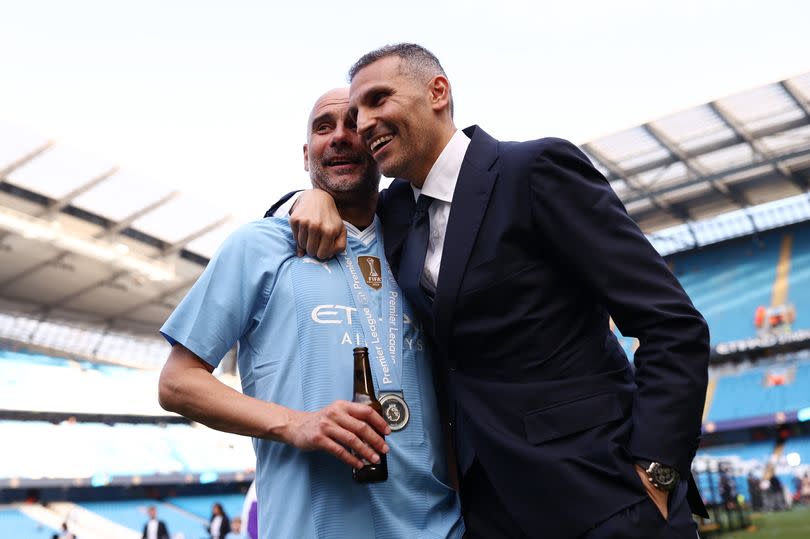What Man City legal case means for 115 charges and Premier League future

While the issue of the 115 charges against Manchester City, brought by the Premier League, looms large, the two will face off before the independent commission later this year.
On Tuesday it was revealed, as first reported by the Times, that Manchester City were launching legal action against the Premier League over its recently passed associated party transaction (APT) that gained the approval of the 14 majority needed to bring it into competition law.
City, recently crowned champions for a fourth time in a row and the sixth time in seven years, will face off in an arbitration hearing between June 10 and 21, with the club believing that the APT rules passed in February are unlawful.
What are Manchester City unhappy about?
When Newcastle United were acquired by the Saudi Arabian Public Investment Fund (PIF) back in late 2021, by December of that year new rules around APT had been voted on by clubs.
Those APT rules were introduced in an attempt to stop any plans to accelerate the growth of Newcastle’s commercial revenue by them leaning on simpatico relationships with big businesses that they had in the Middle East.
As part of these rules, any deal with an associated party, a company which is also under the ownership or has close links with club ownership, had to prove that the deal was of ‘fair market value’.
In February a vote was taken at a shareholder meeting to tighten the restrictions around APT rules, something which the Premier League revealed at the time had prompted one club to threaten legal action.
Manchester City have now followed through with that threat and are taking action against the Premier League.
Will this impact the 115 charges that Manchester City are facing?
The two issues are separate, and Manchester City’s pursuit of legal action against the Premier League is the result of the stricter rules brought in back in February around APT rules and fair market value.
But they could have a ripple effect, with a significant chunk of the charges City are facing relating to the alleged enhancement of commercial income through associated party transactions during the early to mid-2010s.
Should City be able to make a compelling case then it could strengthen their case when they face an independent commission in November in relation to the 115 charges, and the role associated party transactions played in those.
What have Manchester City said?
Speaking in an interview with club media on Wednesday, recorded before the legal action was first reported, City chairman Khaldoon Al Mubarak said: “I hope there's a bit more sensibility in regulating, (that there is) always a balanced approach.
“This is good for all the leagues, be it in England or the rest of Europe. I think you won't see the same level (of transfer spending) as we've seen in the past few years because of the level of regulations that have come into place over the last 12 months."
In its legal submissions related to the challenge of APT rules, City claimed that the rules themselves were “unlawful” and, with the 165-page legal document, argued that they are the victims of “discrimination against Gulf ownership”, describing rules they say have been approved by their rivals to impede the club’s success on the pitch as a “tyranny of the majority.”
Why is this so important and what might it mean for the Premier League?
This is a seismic moment for the world’s biggest, most-watched domestic football league.
A victory for City against the Premier League would cause potentially serious ramifications. For a start, it could open the door to clubs who have owners who can lean on huge commercial relationships to improve revenues to allow them to spend more money on transfers and wages, something that could widen the competitive gap that already exists in the Premier League.
The fact that a majority passed the most recent APT rules should be telling, with a large number of Premier League clubs either under full or partial North American ownership, with private equity invested.
Private equity likes to see a return on investment over time, and North American sports ownership largely wants to see these teams wash their own faces, while doing enough to grow the value of the asset through its increased appeal that can draw greater attention and broadcast revenues. Cost control is something that exists in a big way in US sport, from salary caps to no promotion or relegation, and the financial certainty that comes with that makes it appealing.
Financial controls in the English game being tightened makes the Premier League more investible for some of these groups. A lack of such controls will likely open the door to more nation states and sovereign wealth funds being able to arrive and invest.
For the Premier League the optics are not good, even if they win. Being involved in a civil war with your current champions and being accused of discrimination and tyranny is not ideal for brand and its plans for growth, nor does it do much for quelling any appetite to see such things as the European Super League brought back to the table.

 Yahoo News
Yahoo News 
